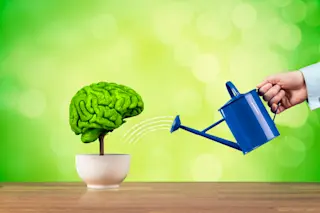Memory is the process of storing and retrieving information in our brains. Many factors affect memory, including age, damage, pain, sleep and stress. Engaging our brains is integral to memory function, and there are many ways to do that. Learning a new language or skill, learning to play an instrument or expanding your vocabulary can all boost memory. So can increased social interaction. Even simpler is lowering sugar intake and eating fewer inflammatory foods. Here are five natural ways to improve your memory.
Eating healthy foods is great for your body and your mind. Besides helping us with our mood and focus, healthy foods are vital for our memory, as well. Blueberries, for example, have been shown to increase blood flow to areas of the brain correlated with memory. One study compared results on memory tests taken by children who drank smoothies with berries, compared to those who didn’t. After ...















